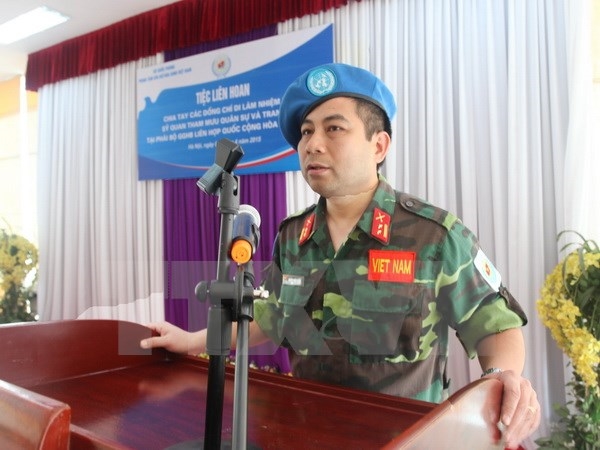.jfif) Opinion
Opinion

Nguyễn Xuân Thành, Lieutenant Colonel from the Viêt Nam Peace Keeping Centre, told the newspaper Hải Quan (Customs) about his two years of experience working at the UN Peace Keeping Centre in the Central African Republic.
 |
Nguyễn Xuân Thành, Lieutenant Colonel from the Viêt Nam Peace Keeping Centre, told the newspaper Hải Quan (Customs) about his two years of experience working at the UN Peace Keeping Centre in the Central African Republic.
What were the challenges that you and your comrades in arms faced during your mission as UN peace keepers in the Central African Republic?
The Central African Republic is a country that has experienced many conflicts, including several coup d’état. In late 2013, when the situation became so serious, the UN decided to help the country establish an interims government headed by a moderate president. As a result, a UN peace keeping centre was established there with a noble mission – to protect the Central African people while maintaining security and stability there. With the UN mandate, we – UN peace keepers had been sent there until a new President and Parliament were elected in late 2015.
Of course, living in such environment, our life was facing many difficulties and challenges.
There were three Vietnamese peace keepers stationed in the African Republic at that time. Our tasks were to conduct daily monitor and write reports on activities of the UN peace keeping mission to send to the UN peace keeping headquarters in New York, the United States.
I should say that the work was so demanding, particularly when the situation there was so tense with many conflicts. For example, in September 2015, there was a serious conflict which lasted more than a month and we had to work round the clock.
In addition, peace keepers from more than 40 countries were sent to work in the Central African State. Working in such an environment was very demanding, particularly because we need to harmonize activities among the UN peace keepers.
Living in a war torn country, every thing was in big shortage, including food and other essential daily necessities. That’s not all as gun fires were heard round the clock. Coupled by those challenges were dangerous diseases, including malaria and yellow fever. Right in the UN peace keeping centre, dozens of people died because of these diseases.
What did you and your colleagues do to overcome those challenges?
Before joining the UN peace keeping forces, we knew that we would face many difficulties and challenges during the mission. But, I and my colleagues all pledged to do our best and fulfilled all the tasks assigned to us. In addition, we had to improve our professional skills while improving our foreign languages.
Before departing to Central Africa, we had to prepare food and other daily essentials, including survival medicines. We even took with us some vegetable seeds with a hope to have some vegetables to feed ourselves in a country where the climate is so severe like Central Africa Republic.
When we arrived there, we did our best to catch up with what was going on there and fulfill all duties assigned to us.
Living far away from home, we - the three Vietnamese soldiers - tried our best to help each other to accomplish our missions.
What lessons have you drawn after completing your assignment in the Central African Republic?
I and my colleagues who had joined the UN keeping missions in other countries have all agreed that it was a valuable lesson for us in serving as UN peace keepers. Through our missions, we have many new friends from other countries and learned many good lessons from them. I could say that we had done our best to create a high profile of Viet Nam in general and the Việt Nam People’s Armed Forces in particular in the eyes of our foreign friends.
We were very proud to work as UN peace keepers along side our foreign peers. Two years working in the Central African Republic was a precious lesson for me and my colleagues as well as for those who would join the UN peace keeping forces in the future._VNS




